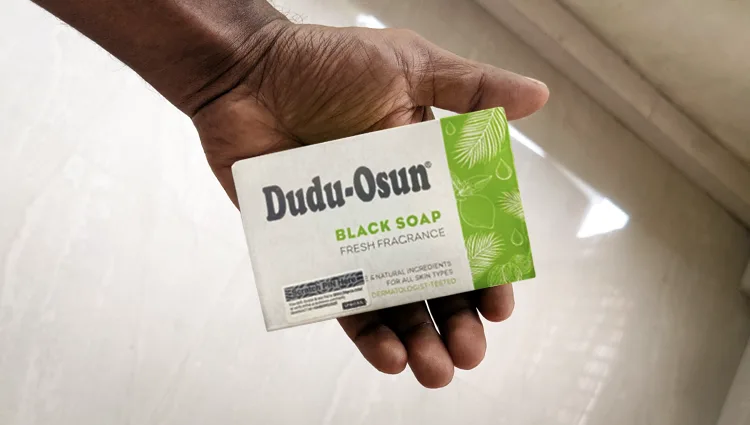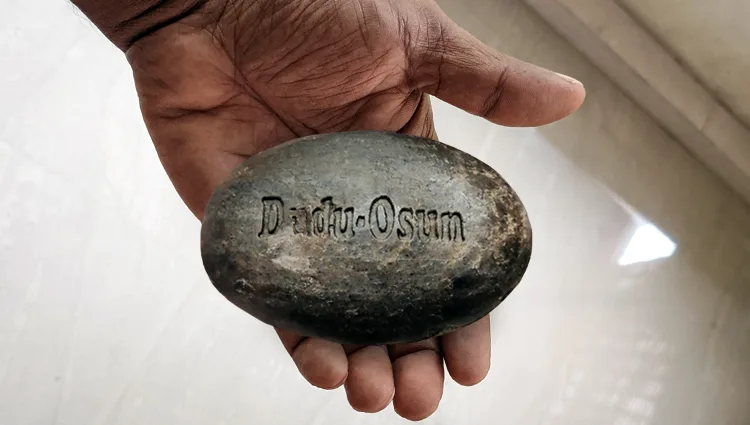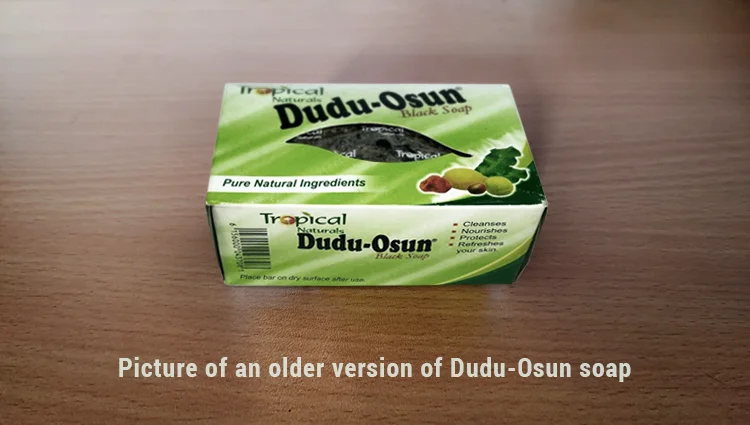Dudu-Osun, the African black soap, is more than just a cleansing agent. Made from traditional, all-natural ingredients found in Nigeria’s tropical rainforests and Savannah regions, it has gained global acclaim for its numerous health benefits. This versatile soap is known for its abilities to aid in the treatment of broad skin conditions such as acne, eczema, dermatitis, and more.
As the flagship product of the company, Tropical Naturals Ltd. (TNL), Dudu-Osun has undergone a recent rebranding and now comes in three unique variants: Fresh, Classic, and Fragrance-Free. Despite the rebranding, older versions of the soap are still available for purchase, and it is important to note that they are not fake just because they are not in the new packaging.

Despite its name, Genuine Dudu-Osun isn’t black per se. Its unique color comes from the inclusion of naturally occurring potash made from plantain and cocoa pods. Additional ingredients like palm kernel oil and natural honey add to its nourishing and moisturizing capabilities, while the invigorating aroma of lemon and lime provides an uplifting effect.
With the increasing popularity of Dudu-Osun, unfortunately, counterfeits have flooded the market, mirroring its genuine counterpart. Fake Dudu-Osun soaps are made using harsh chemicals and artificial colors that counteract the benefits of the rich, natural ingredients found in the genuine kind.
So, the question is – how can you tell if the Dudu-Osun soap you’re buying or using is genuinely authentic? The purpose of this article is to provide a clear guide to identifying original Dudu-Osun soap and steer clear of counterfeits. But let’s first understand the risks of using fake products.
The Risks of Using Fake Dudu Osun Soap
Fake products are often made in unhygienic laboratories. Over time, this can lead to health risks for consumers. Genuine Dudu Osun soap is made with real ingredients and has undergone stringent quality control measures to ensure its authenticity.
Here are some of the risks associated with using fake Dudu Osun soap:
Skin Irritation and Allergies: Fake Dudu-Osun soaps often contain harsh chemicals not suitable for skin contact. These can cause skin irritation and even allergic reactions.
Non-Effective: Unlike the original Dudu-Osun soap known for its effectiveness in managing skin conditions such as acne, eczema, and uneven skin tone, the counterfeit products lack these healing properties, leaving you with unmet expectations.
Economic Impact: By supporting counterfeiters, we’re inadvertently encouraging more fakes to flood the market, damaging the manufacturers’ reputation of the original Dudu Osun soap.
It’s hence necessary to be on the lookout and know how to distinguish between original and fake Dudu-Osun African Black soap to avoid these risks. And that’s what we’ll discuss next!
Identifying Original Dudu Osun Soap
Distinguishing between the original Dudu Osun Soap and a cheap counterfeit requires a keen eye and attention to detail. Here are 12 signs to look out for when trying to identify the genuine Dudu Osun African Black soap.
1. Check the Weight
One of the first things you can do when verifying your Dudu Osun soap is to check its weight. An original soap will weigh exactly 150 grams, which is equivalent to 5.29 ounces. Any soap that deviates from this weight classification could be a red flag that it is a counterfeit. It might seem trivial to look at the weight, but counterfeits often take shortcuts during production, which could alter the weight of the soap. Thus, keeping a keen eye on the weight can save you from investing in a fake product.
2. Observe the Color
Next, the color of an authentic Dudu Osun soap is notably a natural, earthy brown hue, reminiscent of the pure ingredients used, such as palm kernel, cocoa pod ash, palm bunch ash, and honey. Knock-offs, on the other hand, tend to possess an unnatural deep, pitch-black color. The high contrast between the two can easily be spotted if you know what’s expected from the authentic soap. You can inspect the color carefully upon purchase or once you unpack the soap at home.

3. Inspect the Packaging
Packaging is another area where original products usually shine. The Tropical Naturals logo should be prominently printed on the package, signifying its brand identity. Unique to this logo is the dot above the “i”, represented as a leaf, and the “o” as an appealing sun with a palm tree — both embodying the natural, tropical essence of the product’s origins. Checking the barcode is another way to ensure the authenticity of the product.
4. Examine the Contact Details
Counterfeiters often overlook minor details like the manufacturer’s contact details. On every package of genuine Dudu Osun Soap, there is a clear print of the website address: www.duduosun.com and the factory’s address: 10 Wempco Road, Ogba, Lagos, Nigeria. Any form of omission or typographical error in these details would suggest a counterfeit.
5. Understand the Design
The packaging design for Dudu Osun Soap has witnessed a recent rebranding. Older versions would have a leaf-shaped cutout providing a glimpse of the soap within; however, following their rebranding, this is no longer present. Consequently, any ‘new’ box still featuring this cutout could be a counterfeit. Being aware of these design changes and nuances is helpful while identifying the original product.

6. Smell the Fragrance
Scent is an inherent characteristic of Dudu Osun Soaps and a smart way to identify an original from a fake. Genuine Dudu Osun Soaps offer a balanced fusion of citrus and herbal aromas, providing a subtler, more pleasant smell as opposed to counterfeit soaps, which often exude an overpowering and abnormally sweet scent.
7. Feel the Texture
The physical or tactile sense can also offer clues about the soap’s authenticity. Most counterfeits cannot mimic the quality of original soap, hence, often differ in their texture and thickness. Genuine Dudu Osun soaps are notable for their thick, rugged texture — providing a more substantial feeling in the hand than other soaps.
8. Look Out for Misspellings and Grammatical Errors
It might be surprising, but a close inspection of spelling and grammar can often lead to the identification of counterfeit products. Professional and original brands put immense care into their packaging, which includes error-free spelling and grammar. However, most counterfeiters tend to overlook these aspects, allowing for misspellings and grammatical errors to creep onto their packaging.
9. Evaluate the Shape
An original Dudu Osun soap follows a clean, oval shape. This is the standard form that TNL adheres to for producing their soaps. One might notice slight variations in counterfeits. So, being aware of the shape is crucial in detecting a knock-off.
10. Review the Ingredients
Ingredients offer another basis for verification. The original Dudu-Osun soap is concocted from all-natural elements, a secret to its universal appeal. An ingredient list featuring unknown or synthetic constituents might hint towards a counterfeit soap. The ingredients of this soap are listed below:
- Pure Honey
- Shea Butter
- Osun (Camwood)
- Palm Kernel Oil
- Cocoa Pod Ash
- Palm Bunch Ash
- Aloe Vera
- Lime Juice
- Lemon Juice
- Water
- Fragrance
11. Scratch to Reveal a Verification Code
For newer versions of Dudu Osun soap, there is a scratch panel printed on the package that reveals a unique verification code. You can enter this code on their website to verify the authenticity of the product.

12. Use the SMS Verification Service or Sproxil Mobile App
In Nigeria, you can also SMS the verification code to 38353. For all other countries, you can use the Sproxil mobile app to verify the product. If the product verification fails, you have likely bought a counterfeit product.
Where to Buy Original Dudu Osun Soap
Be cautious about where you buy your Dudu-Osun soap. Untrusted or unrecognized online marketplaces and local street vendors might not promise authenticity. The safest bet is always to refer to the company’s official site or its listed foreign distributors.
Avoid buying from unknown sources, because there’s no way to know whether they’re selling you real products or knock-offs. You can also check the store’s reviews before making a purchase.
If you are unsure about the authenticity of your Dudu-Osun soap, contact their customer support team at +234 (0) 1 791 4453, 0700-DUDU-OSUN, +234 (0) 700 3838 6786. They will help verify if it’s genuine!
To sum up
In conclusion, identifying a counterfeit Dudu-Osun African Black soap is crucial to avoid spending money on a subpar product and potentially exposing your skin to harmful ingredients. Keep an eye out for signs such as packaging, ingredients label, color, and fragrance when determining the authenticity of the soap. To guarantee the soap’s genuineness and quality, always purchase from reputable and authorized sellers listed on the company website.
If you’re shopping for Dudu-Osun soap, keep these tips in mind to help protect yourself from purchasing a counterfeit product—and I hope this information will be helpful as you continue your search!
If you have any questions about Dudu-Osun soap or want to share your experience purchasing it, please leave a comment below. Good luck and happy shopping!



My own does not have the scratch pin I bought it from Jumia.